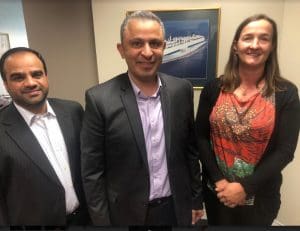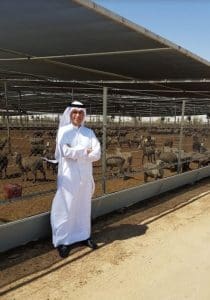
Al Mawashi fleet & international trade manager Ahmed Al Majed, left, with Al Mawashi CEO Osama Boodai and WA sheep producer Bindi Murray in Perth earlier this month.
AUSTRALIA’S biggest sheep buyer Kuwait is turning to building its own flocks, concerned about the plans to halt the Middle East live trade is sees is vital to its food security.
The majority Kuwait government-owned Al Mawashi/Kuwait Livestock and Trading Company operation imported 1.28 million Australian sheep in 2017, out of the total of 1.88 million exported live from Australia.
The company’s chief executive officer Osama Boodai visited Australia earlier this month, following 60 Minutes’ release of video footage showing sheep dead and dying in over-heated crowded conditions on Middle Eastern shipments.
In a translated statement released this week, Mr Boodai said the company was concerned about the future of importing Australian sheep because of suggestions to stop the trade.
“I completely understand why there is outrage at the footage broadcast last month.
“Those conditions are not acceptable to any of us, but that doesn’t represent what normally happens on board,” he said.
“To ignore footage or other evidence of what a livestock journey normally looks like means people are judging us without having all the facts in front of them.
“That’s why we came to Australia earlier this month, to talk to politicians and farmers about the reality of conditions on livestock vessels.”
Mr Boodai said Al Mawashi/Kuwait Livestock Transport and Trading is focused on food security rather than maximising profits.
“It was subsidized by the Kuwait Government until it became self-sustaining.
“The company has been importing Australian sheep for four decades and is the largest importer of Australian sheep,” he said.
“We want to continue, but our food security needs and the doubts about Australian sheep exports means Al Mawashi is already looking to find other secure sources of livestock.”
Live trade threat prompts Kuwait to build its own flocks

Al Mawashi CEO Osama Boodai at the company’s Kuwait feedlot inspecting Australian sheep that arrived on the Al Messilah on Tuesday.
Mr Boodai said Kuwait is not an agricultural region.
“But we sense the threat to livestock imports, we have started building our own flock and hoping to increase its capacity.
“However, there are real limitations to our production potential and ability to ever be self-sufficient,” he said.
“That’s why for countries in the Gulf, the livestock trade is a matter of national food security.”
Mr Boodai said Al Mawashi takes animal welfare very seriously and had a proud record in terms of the livestock in our care.
“As Muslims, we are committed to preventing animal cruelty. We are instructed by our Quran and the way Prophet Mohammed guided us about the treatment of animals.
“Al Mawashi is run on these principles and we are deeply saddened when any animal dies on of our ships or in our feedlots.”
The company’s supply chain investments include the world’s biggest covered feedlot, a new A$70 million closed-loop abattoir in Kuwait, and a new $110m livestock vessel due to be launched in 2019.
“Our company’s farms, feedlots, vessels, livestock trucks, fodder infrastructure and abattoirs are all geared for imported live animals.
“For us, live animals are absolutely important for food security.”
Mr Boodai said the risks associated with unpredictable weather, especially in the Arabian Gulf, need to be managed, but the company planned to maintain animal welfare 12 months a year.
“Al Mawashi has upgraded its ventilation systems on its two vessels, the Al Messilah and Al Shuwiakh, not because we’ve been forced to, but because investing in the health of the sheep is good for business.
“That’s also why we already reduce summer stocking densities and why we contribute greatly to livestock export industry research and development programs.”
Mr Boodai said in the past five years, Al Mawashi has conducted 78 voyages from Australia to the Arabian Gulf on our own vessels with an average mortality rate of less than 0.6 percent.
“We are working hard and investing millions of dollars to reduce mortalities and welfare risks even more across the supply chain.
“For example, in 2017 the mortality rate in our Kuwait feedlot – which is the largest covered feedlot in the world with a capacity of 250,000 sheep – was 0.19 percent.”
Chilled meat will never replace live trade

Al Mawashi next year aims to launch the world’s fastest live sheep vessel, the A$110m 80,000 sheep-capacity Al Kuwait, that will have a top speed of 19.5 knots.
Mr Boodai said Al Mawashi is already importing large volumes of chilled and frozen Australian meat.
“These have different markets and will never replace the livestock trade.
“Live, frozen and chilled support food security as a whole, but one does not replace the other.”
He said Kuwait, like Saudi Arabia, which ceased importing Australian sheep in 2012, has a specific demand for live sheep.
“Anyone who argued Saudi Arabia would simply start importing chilled or frozen sheep meat instead of live sheep has been proven wrong, because the Saudis continue to source millions of livestock each year from other regions like the Horn of Africa.”
Mr Boodai said Muslim customers in Kuwait and elsewhere in the Middle East have strong religious and cultural beliefs in terms of animal welfare and how an animal should be humanely slaughtered.
“We believe that by applying a single swift cut with a sharp knife to the sheep’s neck, the animal loses all senses very rapidly.
“We do not believe it is acceptable to torture the animal before it is slaughtered,” he said.
“Many customers do not believe it is good welfare to use a stunner device on an animal and then slaughter it.
“That is why many of our customers will not accept Australian pre-stunned sheep meat, even if it is marketed as Halal.”

When you see some of the botched stunned slaughters in Australia, you can’t help but agree with him. A a good non-stun Halal slaughter can be better than a bad stunned “Western” slaughter. But how often are Halal slaughters good? As frequently as “Western” stunned, non-Halal slaughters are bad? Maybe.
But unless the export companies and shipping companies are going to foot the bill for refrigerated air conditioning on all the ships, there is no way to get around the fact that regardless of loading density reductions, increased fines and “independent” observers, sheep are going to suffer and die from heat stress.